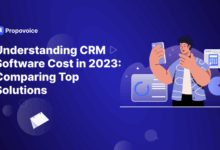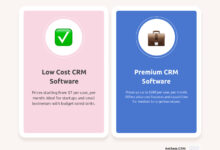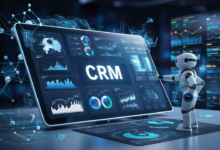Best Enterprise CRM Solutions: Streamlining Customer Relationship Management For Businesses
Kicking off with Best Enterprise CRM Solutions, this paragraph aims to offer an insightful overview of how businesses can benefit from robust CRM systems tailored for enterprise needs.
Exploring the key features, top considerations, and integration processes, this discussion sheds light on the importance of efficient CRM solutions in today’s competitive landscape.
Overview of Enterprise CRM Solutions
Enterprise CRM solutions are comprehensive customer relationship management platforms specifically designed for large organizations to effectively manage their interactions with customers. These solutions play a crucial role in streamlining processes, improving customer satisfaction, and driving business growth.
Importance of Enterprise CRM Solutions
Enterprise CRM solutions are essential for businesses to maintain and enhance customer relationships in a scalable and efficient manner. They provide a centralized platform for collecting and analyzing customer data, enabling personalized interactions and targeted marketing strategies.
- Improved Customer Service: Enterprise CRM solutions help businesses deliver exceptional customer service by ensuring timely responses to queries and resolving issues efficiently.
- Enhanced Sales Performance: By tracking customer interactions and preferences, these solutions empower sales teams to identify opportunities, prioritize leads, and close deals effectively.
- Data Integration: Enterprise CRM solutions integrate with various systems and channels to provide a holistic view of customer interactions, enabling better decision-making and personalized experiences.
Industries Benefiting from Enterprise CRM Solutions
Various industries benefit from Enterprise CRM solutions, including:
- Financial Services: Banks and financial institutions use CRM solutions to manage customer accounts, track financial transactions, and offer personalized financial advice.
- Retail: Retailers leverage CRM systems to analyze customer buying behavior, manage loyalty programs, and optimize inventory management.
- Healthcare: Healthcare providers utilize CRM solutions to improve patient care, streamline appointment scheduling, and maintain accurate medical records.
Key Features of Enterprise CRM Solutions
Enterprise CRM solutions offer advanced features that distinguish them from standard CRM software:
- Scalability: Enterprise CRM solutions are scalable to accommodate the needs of large organizations with a high volume of customer interactions and data.
- Customization: These solutions allow businesses to tailor the CRM system to their specific requirements, processes, and workflows.
- Analytics and Reporting: Enterprise CRM solutions provide in-depth analytics and reporting capabilities to track performance metrics, identify trends, and make data-driven decisions.
Top Features to Look for in Enterprise CRM Solutions
When choosing an Enterprise CRM solution, it is crucial to consider the following key features that can make a significant impact on your business:
Scalability
Scalability is essential for growing businesses as it allows the CRM system to expand and adapt as the company grows. Look for a solution that can accommodate a large number of users and data without compromising performance.
Customization
Customization capabilities are crucial to tailor the CRM system to meet the unique needs of your business. Ensure that the solution allows you to customize fields, layouts, workflows, and reports according to your specific requirements.
Integration Capabilities
Integration capabilities enable seamless communication between the CRM solution and other essential business systems such as marketing automation, ERP, and accounting software. Choose a CRM solution that offers easy integration with third-party applications.
AI-Driven Analytics and Automation
AI-driven analytics and automation features can provide valuable insights into customer behavior, trends, and preferences. These capabilities can help streamline processes, improve decision-making, and enhance customer engagement. Look for CRM solutions that leverage AI technology for predictive analytics and automated workflows.
Real-World Examples
Companies like Amazon and Salesforce have excelled in their respective industries by leveraging specific CRM features. Amazon’s personalized recommendations are powered by AI-driven analytics, while Salesforce’s customizable dashboards and reports enable businesses to gain actionable insights for strategic decision-making.
Implementation and Integration of Enterprise CRM Solutions
Implementing and integrating an Enterprise CRM solution within a large organization can be a complex process that requires careful planning and execution. Below are the steps involved in this process, along with challenges that may arise and best practices to ensure a smooth transition.
Steps for Implementing an Enterprise CRM Solution
- Assessing the organization’s needs and goals to determine the right CRM solution.
- Selecting a reliable CRM vendor that aligns with the organization’s requirements.
- Customizing the CRM system to fit the organization’s specific processes and workflows.
- Integrating the CRM solution with existing systems, such as ERP or marketing automation tools.
- Training employees on how to use the new CRM system effectively.
- Testing the CRM solution thoroughly before full deployment.
- Rolling out the CRM system gradually across different departments to minimize disruptions.
Challenges During Integration and How to Overcome Them
- Data migration issues, such as data duplication or loss, can occur during integration. To overcome this, ensure data mapping is done accurately and conduct regular data quality checks.
- Resistance to change from employees who are accustomed to old processes. Encourage open communication, provide adequate training, and highlight the benefits of the new CRM system to mitigate resistance.
- Poor system adoption due to lack of user engagement. Involve end-users in the decision-making process, offer ongoing support, and incentivize usage to increase user adoption rates.
Best Practices for a Smooth Transition to a New CRM System
- Establish clear goals and objectives for the CRM implementation to ensure alignment with the organization’s overall strategy.
- Communicate regularly with stakeholders to keep them informed about the progress of the CRM implementation and address any concerns promptly.
- Provide comprehensive training to employees at all levels to ensure they are proficient in using the CRM system effectively.
- Assign a dedicated project team to oversee the implementation process and address any issues that may arise in a timely manner.
Role of Training and Change Management in Successful CRM Implementation
Training and change management play a crucial role in the successful implementation of an Enterprise CRM solution. By providing employees with the necessary skills and knowledge to effectively use the CRM system, organizations can maximize the benefits of their investment. Change management strategies help in preparing employees for the transition, addressing resistance, and ensuring a smooth adoption of the new CRM system.
Security and Compliance Considerations for Enterprise CRM Solutions
Ensuring data security and compliance is crucial when implementing Enterprise CRM solutions to protect sensitive information and adhere to regulations.
Common Security Threats Faced by CRM Platforms and Mitigation Strategies
CRM platforms face various security threats such as data breaches, unauthorized access, and malware attacks. To mitigate these risks, organizations can:
- Implement encryption methods to secure data both in transit and at rest.
- Enforce strong password policies and multi-factor authentication to prevent unauthorized access.
- Regularly update software and systems to patch vulnerabilities and protect against malware.
- Monitor user activities and access permissions to prevent internal threats.
Data Protection Measures in Enterprise CRM Solutions
Organizations should incorporate the following data protection measures in their Enterprise CRM solutions:
- Role-based access controls to limit data access based on user roles and responsibilities.
- Regular data backups to prevent data loss in case of system failures or cyber attacks.
- Data encryption for sensitive information to ensure confidentiality and integrity.
- Audit trails to track user activities and changes made to the CRM system for accountability.
Impact of GDPR and Regulations on CRM Systems
The General Data Protection Regulation (GDPR) and other regulations have a significant impact on the use of CRM systems in enterprise settings:
- Organizations must obtain explicit consent from individuals to collect and process their personal data.
- CRM systems should offer data portability and the right to erasure to comply with GDPR requirements.
- Data controllers and processors are required to implement appropriate security measures to protect personal data.
- Non-compliance with regulations can result in hefty fines and damage to the organization’s reputation.
Wrap-Up
In conclusion, Best Enterprise CRM Solutions play a crucial role in enhancing customer relationships, improving operational efficiency, and driving business growth. By embracing these advanced CRM tools, companies can stay ahead of the curve and deliver exceptional customer experiences.


